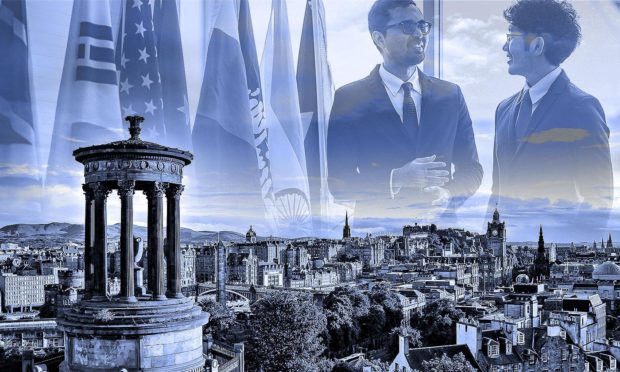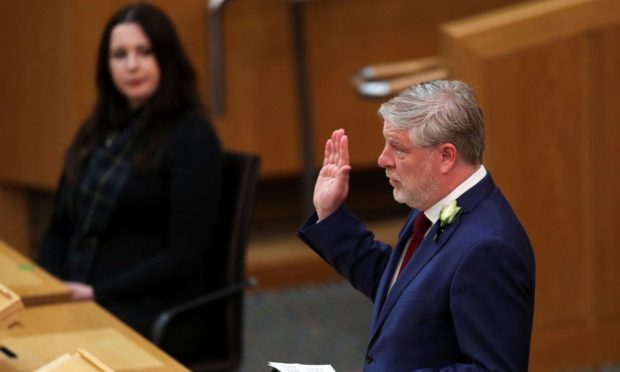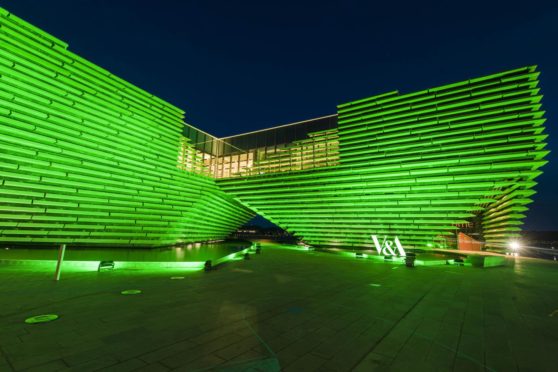From grand mansions in Edinburgh to a petrol station in Stornoway, you can find diplomatic representatives of foreign governments the length and breadth of Scotland.
Far from the myth that diplomatic life is an endless whirl of cocktail parties and silver platters piled high with nutty chocolates (“Monsieur, with these Ferrero Rocher you are really spoiling us!”) the diplomats who ply their trade in Scotland have a varied existence.
They’re generally split into two types of missions: the career diplomats based at Consuls General in Edinburgh and Glasgow; and more than five dozen honorary consulates scattered around the country who most likely have a main job, but work as well on behalf of a foreign nation – often in a voluntary capacity.
“I warmly welcome the fact that so many countries take an active interest in this country – including choosing to locate significant consular and diplomatic representation in Scotland” says Angus Robertson, the Scottish Government’s Cabinet Secretary for External Affairs.
“Scotland has a long and rich history of cultural, political and economic exchange, and we are determined to continue our necessary and fruitful work to forge and sustain links with other countries” he adds.
The diplomats have to tread a fine line however, as foreign affairs are reserved to Westminster and they can’t be seen to forge too-close links to the Scottish Government, in case it appears to be de facto bilateral diplomatic relations. Most of that is channelled through the countries’ main embassies in London.
But there is some level of contacts between the Scottish Government and the Consuls General, to keep them updated on government policy and initiatives, in particular during the Covid-19 pandemic.
Meet the envoy from the Emerald Isle
Ireland’s Consul General in Edinburgh has a role that’s more political than most thanks to the Good Friday Agreement and the fact the Scottish Government hosts the British-Irish Council, with its secretariat in Edinburgh.
A career diplomat, Jane McCulloch studied in St Andrew’s before joining the Irish Department of Foreign Affairs in Dublin. She’s been posted to Edinburgh for the last two years but like everyone else it’s been a far-from-normal experience.
“As the Covid-19 pandemic reached these shores, we were preparing to celebrate St Patrick’s Day with our friends all across Scotland, and the Consulate’s St Patrick’s Day reception was one of the first big cancellations in Edinburgh”
“Along with our colleagues across the Department of Foreign Affairs global network, we left our offices and from our kitchen tables activated our crisis plans, working on information gathering and sharing, assisting in the repatriation of our citizens, and reporting on local developments” Ms McCulloch explains.
A Consul General of Ireland in Scotland should spend at least 60% of her time beyond her own front door.”
Her small team of four people have been working from home ever since, but still need to take care of the full spectrum of diplomatic work from helping people who lost their passports to conducting a full-blown review of relations between the Irish and Scottish governments.
“I was tasked with leading, along with the head of the Scottish Government’s Office in Dublin, a joint bilateral review of relations between Ireland and Scotland, within areas of joint interest which are devolved to Scotland,” the Consul General explains.
“We held discussions across governments and with many external partners, and conducted a public consultation to which we received overwhelmingly positive responses and which was a great source of information and ideas.”
The results of the report will help shape relations between the two countries and the work of the Consulate General in Edinburgh over the coming years.
But it’s not all serious hard policy slog for the consulate team, there’s still time for lighter moments too – like when the V&A Dundee turned green to mark the city’s historic connections with Ireland, and the building’s Irish engineering.
“A Consul General of Ireland in Scotland should spend at least 60% of her time beyond her own front door, so that has been the greatest change for me” says Jane McCulloch.
“Trying to replicate those connections on a screen has been challenging, and I’m glad of the chance to get out and about to meet people face to face again.”
From Estonia to Edinburgh
Estonia’s Honorary Consul to Scotland Peter Ferry describes his role as “chief cook and bottle washer.”
The tech entrepreneur, with his Estonian family, spent time living and working in the Baltic nation, has been Estonia’s man in the Scottish capital for the last four years.
Aside from his day job, he might also be found giving out passports and ID cards to Estonian citizens, or promoting Estonia as a place for Scottish companies to do business.
“Edinburgh was always somewhere the Estonian embassy [in London] was keen to have a consul because of the proximity to the Scottish Parliament and the consular scene in Scotland, but we also have quite a concentration of Estonian citizens because many Estonians will come to Edinburgh and Glasgow universities, they will come to the UK to study, quite a lot of them choose to stay on,” Mr Ferry explains.
After Estonia’s second independence in 1991 a number of people came to work in industries that needed labour, especially in agriculture jobs up the east coast and in food processing industries in the west. Those families put down roots in Scotland and remained, so Peter Ferry reckons there could soon be another Estonian honorary consulate opened in Glasgow, to work with him in Edinburgh and his colleague in Aberdeen.
“We get involved quite a lot with Estonian tech companies who are trying to build bridges into some of the public services tech,” the Honorary Consul says.
“I act as a bridgehead to help those companies make connections and generally to build Estonian businesses in the UK,” he adds.
Honorary consulates scattered around Scotland
While there’s a concentration of honorary consulates in Edinburgh and Glasgow there’s also dozens scattered throughout the country.
From Lerwick in Shetland where you can find German, Swedish and French Honorary Consuls – the latter working out of the Shetland Seafood Centre – to the Chileans in Argyll, Namibians in East Lothian, and Brazilians in South Lanarkshire.
The Danes are well represented in Scotland’s coastal communities like Aberdeen, Wick and Stornoway where the Honorary Consul operates from a petrol station.
“They mostly deal with passport extensions and emergency passports, but consulates are also very helpful if we need information about local developments or contacts in the local community” explains Jakob Holm from the Royal Danish Embassy in London.
Those mini-missions are there for legacy reasons, highlighting the enduring relationships between Scottish port towns and Denmark’s fishing industry.
“When the embassy does events around the UK for Danish businesses, those consulates can be involved,” says Mr Holm.
“The honorary consulates go way back because of our historic maritime links.”



